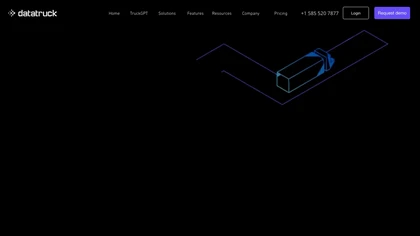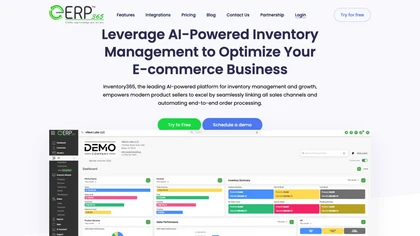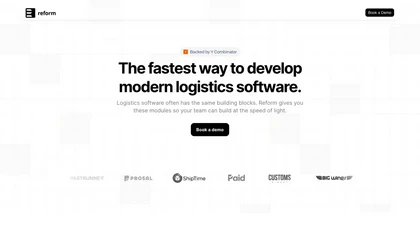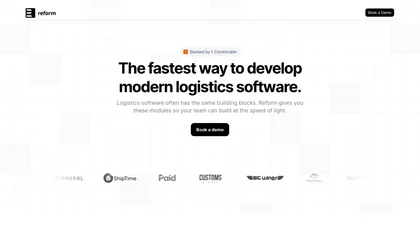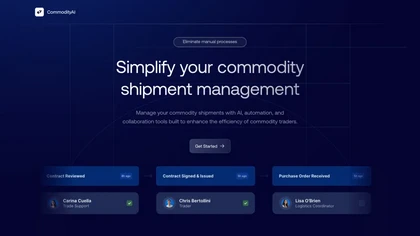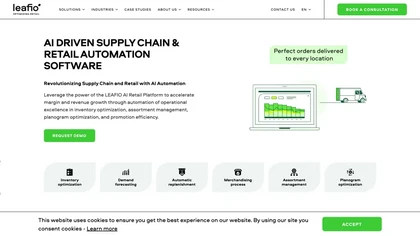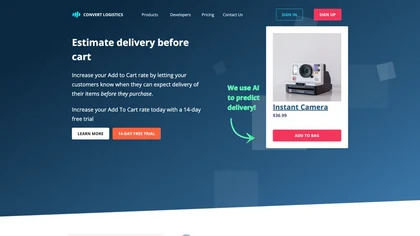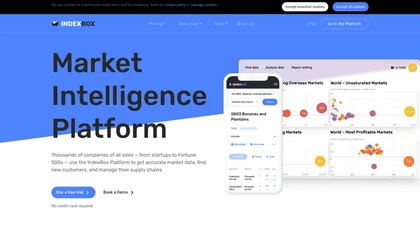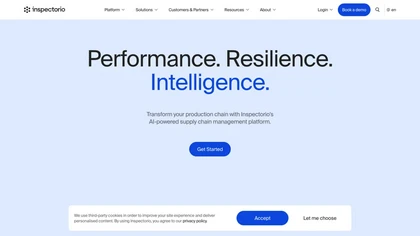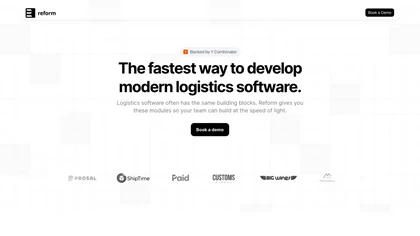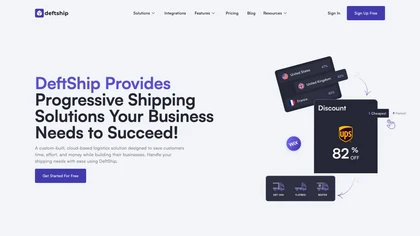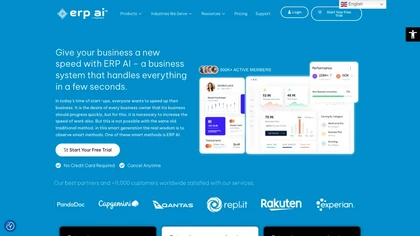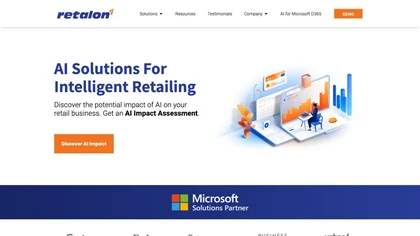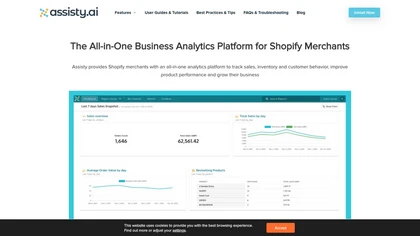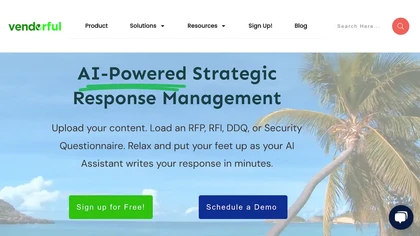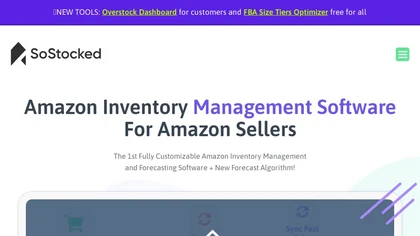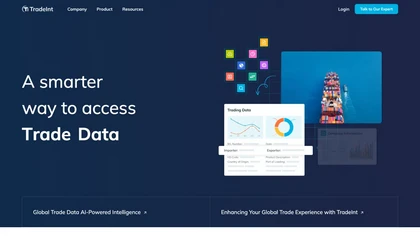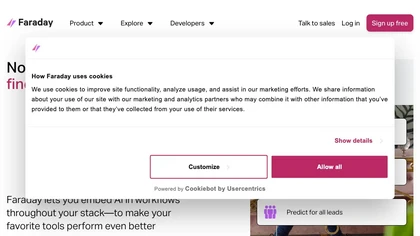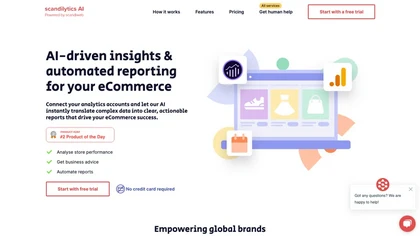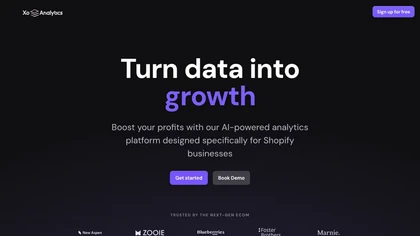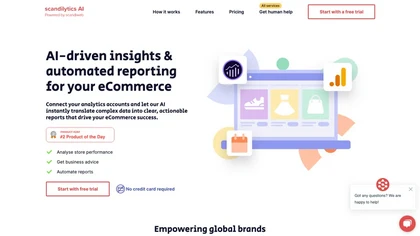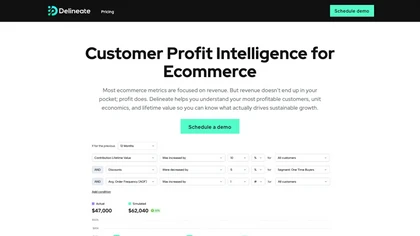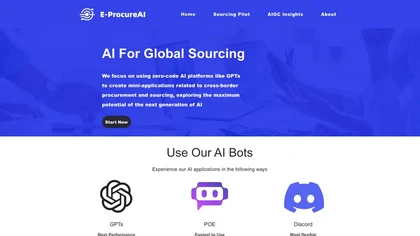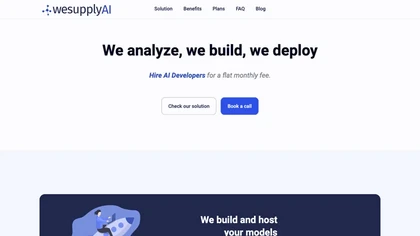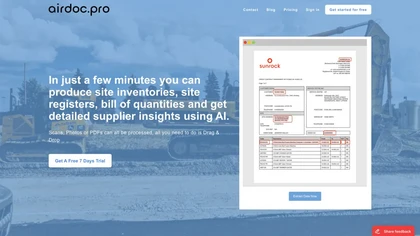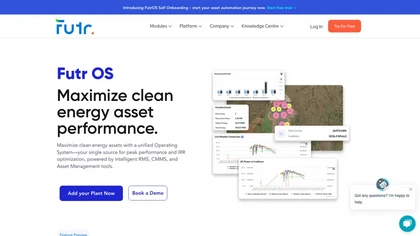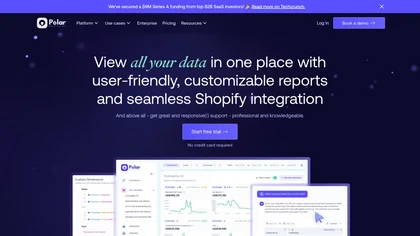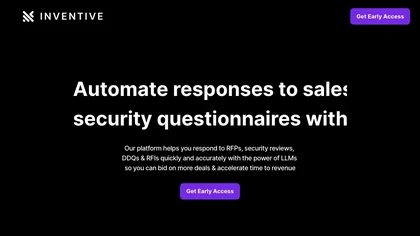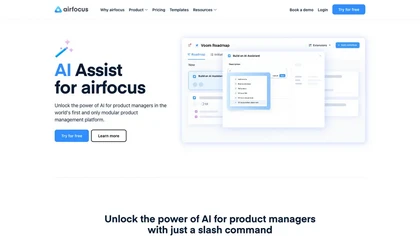AI use cases for Logistics
Generative AI can be applied in various applications for logistics. Here are some examples to explore below for inspiration with AI tools to get you started with using AI in logistics.
🛠️ 70 AI tools for Logistics
Explore a dynamic list of some of the most popular tools to get you started with various AI use cases and applications for Logistics to streamline your workflows and productivity today.
Demand Forecast features
- Utilizes classical machine learning algorithms
- Allows uploading data sets from Excel
- Automatically selects the best model for each product
- Provides clear visualizations and interactive graphs for demand predictions
- Includes features like historical data analysis, outlier detection, model competition algorithms, and KPI forecast systems
Datatruck features
- Automating manual processes
- Providing reporting analytics
- Offering actionable insights through AI/ML analytics
- Hyper automation capabilities
- Seamless data integration and real-time visibility
Inventory365 features
- Real-Time Inventory Tracking
- Warehouse Management
- Multi-location Fulfillment
- AI-Powered Demand Prediction
- Seamless Integration
Reform features
- Modular building blocks for customized solutions
- State-of-the-art multimodal AI models for logistics documentation
- Automation of data capture for various documents
- Seamless integration with universal transportation management systems (TMS) through a universal API
- Embeddable customer dashboards for real-time data insights
5-Out features
- Predicting sales
- Optimizing labor
- Optimizing purchasing
- Quick setup
- Getting started
Unfig features
- Automated data capture from various logistics documents
- Universal TMS integrations for seamless connectivity
- Embeddable customer dashboards for real-time data insights
- Scraping information from numerous sources for visibility into logistics data
- Streamlining logistics operations with unprecedented speed and efficiency
CommodityAI features
- Automated shipment processes
- Auto-generated shipping nominations
- Real-time shipment tracking
- AI-driven performance analytics
- Smart data extraction
🔥
Create your account, save tools & get personal recommendations
Receive a weekly digest of our handpicked top tools.
Unsubscribe anytime
LEAFIO AI Retail features
- AI-driven supply chain and retail automation software
- Automation of inventory optimization, assortment management, planogram optimization, and promotion efficiency
- Features such as demand forecasting, automatic replenishment, and merchandising process optimization
- Caters to various industries including retail, grocery, convenience stores, pharmacies, liquor stores, etc.
- Comprehensive suite of AI-powered tools to streamline retail operations and drive profitable growth
Dairytech.ai features
- milkround automation
- automatic payment collection
- stock reconciliation
- online order management
- customer communication
Predict Expert AI features
- Crafting unique AI models
- Integrating intelligent applications and APIs
- Tailoring AI models and applications to address specific business needs
- Real-time operational insights
- Monitoring performance in real-time
Covonyx features
- Estimates e-commerce shipping and fulfillment arrival dates
- Determines end users' zip codes for precise location detection
- Estimates tax rate in the cart based on user's location
- Provides API for developers to customize shipping estimates
- Enables fulfillment prioritization based on business days, holidays, warehouse locations, and product inventory
IndexBox
5IndexBox features
- Access to accurate market data
- User-friendly interface for quick generation of market reports
- Predictive modeling for forecasting market trends
- Machine learning capabilities
- Data integrity through cross-checking from multiple sources
inspectorio.com features
- AI-powered supply chain management platform
- Utilization of innovative technologies like AI
- Digitizes and connects supply chain processes within a single tool
- Enables intelligent analysis of the entire ecosystem
- Reduces production chain risks through advanced analytics
Reform features
- Modular building blocks for rapid customization
- Automated data extraction from various documents
- Seamless integration with universal TMS platforms
- Real-time visibility into logistics data
- Efficient data scraping from multiple sources
WasteAID features
- Automatic route auditing
- Integration with existing systems
- Audit over 400k generators and 1m+ pickups
- Detect overflow incidents and identify contamination
- Tracking commercial account compliance
Deftship features
- Cloud-based logistics solution
- Automation features for creating rules based on conditions
- Carrier integration without coding
- Real-time freight quotes
- API functionality for limitless possibilities in shipping processes
MEJ ERP AI features
- Intelligent automation
- Data-driven insights
- Real-time analytics
- Predictive forecasting
- Seamless integration capabilities
Cargo features
- Data visualization
- Data discovery
- Data integration
- Automated reporting
- Revops workflow
retalon.com features
- Predictive analytics
- Demand forecasting
- Merchandise planning
- Smart fulfillment
- Ecommerce operations
Trade Foresight features
- Trade insights
- Tools for decision making
- Proprietary trade-technology
- Market access
- Affordable cost
Zuro features
- Generative AI solutions
- LLM technology
- Structured and unstructured data processing
- Predictive model creation
- End-to-end workflow integration
idPOD features
- Data integration and analysis
- Integration of multiple data sources
- Advanced algorithms
- Customizable features
- Improving decision-making
assisty.ai features
- Retail chatbot menu tool
- Generating inventory and sales reports
- Exporting data and creating custom dashboards
- User-friendly pre-built reports
- Advanced data drill-down and automation capabilities
Vendorful.ai features
- Vendorful ai-powered response management streamlines responses to rfps, rfis, rfqs, and it security questionnaires with ai assistance.
- It is particularly useful for overworked account executives, rfp teams, and startup founders.
- Currently free while gathering feedback.
- Vendorful assures data security through encryption and organization-level data separation.
Bara Platform features
- Advanced artificial intelligence tool
- In-depth analytics and predictive insights
- Cutting-edge algorithms and machine learning capabilities
- Intuitive dashboard for visualizing complex data sets
- Actionable insights for strategic decision-making
Brightflow AI features
- Ecommerce financial intelligence platform
- AI-powered financial services
- Accurate cash flow forecasting
- Real-time cash position monitoring
- Integration with popular ecommerce tools
Convictional features
- Streamline onboarding vendors
- Standardize product content for retailers
- Reduce merchandising tasks by up to 75%
- Automated vendor payouts through integrated systems like Stripe
- Supports a range of integration methods with major ecommerce platforms like Shopify and Magento 2
SoStocked features
- Amazon inventory management
- Forecasting
- Customizable features
- Data migration
- Personalized onboarding support
Forescribe features
- Discover, analyze, and manage integrations of SaaS applications
- Provide real-time insights on SaaS usage and compliance
- Automated compliance checks for SaaS applications
- Offer cost optimization suggestions for SaaS applications
- Enhance transparency in digital landscape governance
GearChain features
- Real-time AI-powered inventory management
- No-code builder for customizing forms and generating barcode scans
- Blockchain technology for data integrity and transparency
- Role-based access control for security
- AI algorithms for auto-generating forms
TradeInt features
- Comprehensive global trade solutions
- Access to import and export data from major trading economies
- Data-driven strategies development
- Identification of new market opportunities
- Global trade analytics
DEVTOM features
- Real-time market data utilization
- AI-driven analyses
- AI sentiment analysis
- Competitive analysis
- Supply chain intelligence
Faraday features
- Predicting customer behavior
- Assessing customer potential
- Providing personalized recommendations
- Identifying at-risk customers
- Optimizing marketing campaigns
Scandilytics features
- Advanced analytics for store performance insights
- Business advice based on data analysis
- Automated reporting processes
- Connection with analytics accounts for data translation
- AI-based trend analysis and opportunity identification
Productroadmap features
- Automatically connects with crm and support tools
- Prioritizes feature gaps based on revenue potential
- Surfaces key themes, common feature requests
- Streamlines collaboration between product teams
XO Analytics features
- E-commerce analytics platform
- Next-gen e-commerce integrations
- Customizable alerts
- Real-time performance monitoring
- Personalized data-driven tips
secretsaucepartners.com features
- Fit Predictor
- Style Finder
- Outfit Maker
- Seamless integration
- A/B testing
Manifest AI features
- Product recommendation
- Natural language processing
- Customization
- Purchase decision support
- Multilingual
Mom shop app features
- AI-powered features
- Streamlined e-commerce
- Effective service management
- AI-generated content
- Simplified order management
Fforward features
- Extract valuable insights from interview transcripts
- Identify customer opportunities
- Synthesize themes across multiple interviews
- Customizable accessibility options
- Collaborative filtering systems for better suggestions
ComeHome features
- Item list creation
- Cost estimate generation
- Quote comparison
- AI-powered inventory list generation
- Secure data sharing with movers
Data Analyst AI features
- Data Analyst AI
- Automated reporting
- Tailored marketing strategies
- Streamlined marketing efforts
- Secure data processing
Incremental ai features
- Retail media measurement
- Commerce analytics
- Portfolio management
- Predictive analytics
- Cross-channel commerce analytics
FolioProjects features
- AI project management assistant
- Data-rich dashboards for analysis
- Project portfolio management workflow
- Enterprise asset management life cycle support
- Predictive, prescriptive, and generative AI capabilities
FrequentlyAI features
- Answering amazon-related queries
- Using gpt4 for complex answers
- Using gpt3.5 for faster responses
- Curated by a team of experts
- Ongoing updates
Breadcrumbs Copilot features
Delineate features
- Unified analytics for financial, customer, product, and marketing insights
- AI predictive lead scoring
- Customer analytics, cohort analysis, customer lifecycle analysis, and customer segments
- Scenario simulation
- Data integration from various sources
RapidAI features
- Customized AI tools
- Streamline operations
- Reduce costs
- Range of powerful AI tools
- Optimize work
Chart features
- Ml inference
- Cloud based
- Own
- Lightning
Push Lap Wholesale features
- 97% matching accuracy
- Analyze thousands of products in minutes
- Bulk upload lists of suppliers for product search
- Accurate profit calculations and demand estimation
- Powerful sorting and filtering options
Perceptif features
- Auto-discovery
- Custom experiences
- Process optimization
- Benchmarking solutions
- Competitor analysis
PharmaTrace features
- Chronic disease management
- Early disease detection
- Economic costs reduction
- Budget forecasting
- Decision support
E-Procure AI features
- Zero-code AI platform integration
- Recommendation of supply locations and suppliers
- Market expansion assistance
- Product opportunity identification
- Real-time exchange rate inquiries
Data on Demand features
- Seamless integration of generative AI throughout enterprises
- Management of diverse data sources
- Expedited responsible AI workflows
- Efficient extraction and analysis of relevant data
- Visualization of complex datasets
wesupplyAI features
- AI model analysis
- AI model building
- AI model deployment
- Dataset uploading to secure cloud environment
- Integration of personalized APIs
Out Of The Blue features
- Real-time revenue-impacting event detection
- Identification of revenue leaks and issues
- Detection of revenue-impacting infra errors and user engagement/navigation issues
- Transition from manual monitoring to AI-driven proactive approach
- Optimizing ad spends and customer communication
Sku Fetch features
- Data fetching from multiple suppliers
- Support for popular marketplaces
- Keyword finder and product UPC addition
- Competition analysis and reviews integration
- Leverages OpenAI capabilities for rewriting and summarizing
Scios.ai features
- predictive modeling
- prescriptive analytics
- scenario exploration
- data-backed decisions
- human-centric AI
Relatas features
- Streamlines sales reviews
- Connects sales activities, pipelines, and forecasts
- Automated deal creation feature
- Quotation intelligence for faster processes
- Real-time pipeline updates
Smartersales features
- Integration with zoom, teams, and meet
- Automated crm data entry
- Instant personalized feedback
- Detailed performance dashboards and summarized email reports
- Customizable experience
Airdoc.Pro features
- Data extraction
- Document scanning
- Data categorization
- Automated organization
- Material delivery tracking
FutrOS features
- Unified operating system
- Warranty management
- Digital twin technology
- Automated performance insights
- Real-time alerts
FlowCog features
- User-friendly Flowcog Canvas for financial projections
- AI-driven inputs for streamlined modeling process
- Support for integrations with QuickBooks and Stripe
- Detailed financial statements and saas metrics
- Simulation analysis and data visualization dashboards
Polar features
- 1-click integrations
- Custom reporting dashboards
- Predictive forecasts
- Smart alerts and insights
- First-party attribution
Glass features
- Omnichannel customer relationship automation
- Integration with various platforms like WhatsApp, chat APIs, Instagram, and QR codes
- Virtual business analyst capabilities
- AI-powered chatbots for 24/7 support and personalized engagements
- Predictive analytics for better product optimization
Trend Rocket features
- Glean insights on brands, industries and products with expert reports
- Track brand growth month over month
- Centralize data on one dashboard
- Understand brand advertising on social media platforms
- Search by various metrics for detailed insights
Inventive features
- Streamline rfis, rfqs, security reviews, rfps
- Generate reliable answers with ai
- Reduce reliance on subject matter experts
- Save substantial time and effort
- Up-to-date content
Graphite Note features
- Predict outcomes
- Recommend smart actions
- Analyze customer behavior patterns
- Personalize marketing strategies
- Optimize inventory
Saara.io features
- Focus on solving common industry challenges
- Reduce operational costs
- Analyzing customer data for personalized offers and improved shopping experience
AI Assist by airfocus features
- AI-generated ideas and drafts
- Sentiment analysis
- Utilize slash commands
- Prompt features for PRDs and user stories creation
- Feedback sentiment analysis

